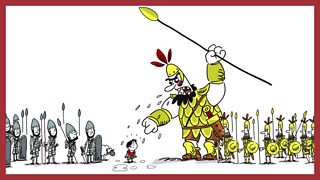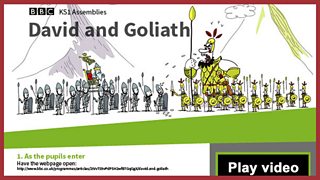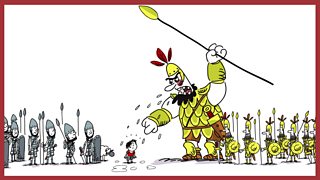David and Goliath
Themes: the story of David and Goliath; thinking about the big things in our own lives; ‘standing up’ to others.
Summary: This assembly focuses on the story of David and Goliath from the Bible (I Samuel, chapter 17) and is suitable for an act of Collective Worship. You will need some small stones to leave at the front of the hall for the reflective activity that follows. There is a suggestion for resources for a reflective area for each classroom based on David’s five stones - and how they might represent bringing challenges to God, or as a way of reflecting on ways to deal with things that feel 'big' to us. If you decide to do this, each class will need five small stones.
Key links
-
![]()
Assembly framework (pdf)
Print the assembly framework script ready for use
-
![]()
Image of David (Israelite) and Goliath (Philistine)
Click to display a full-size image of David and Goliath
The video:

Goliath is big...but God is bigger!David
The video tells the story of the shepherd boy, David, and a fearsome warrior, Goliath. The Israelites and the Philistines are at war and the Philistine army have a giant of a champion in Goliath. No-one has ever been brave enough to challenge Goliath, until David comes with his sling and five small stones. David says that he does not need armour and that with God's help he will defeat Goliath - which he does, with a single stone from his sling.
Duration: 5' 43"
End of speech: '...Goliath the big elephant, beaten by David, the tiny ant.'
Story questions
What are the names of the two sides fighting?
The Israelites and the Philistines
Which side is Goliath fighting on?
He is a champion of the Philistines
What is the name of David's father?
Jesse
Why isn't David fighting alongside his brothers?
His father has told him he is too small and is not brave enough
What does David say he will need to defeat Goliath?
A sling and five stones
What words does Goliath use to taunt David?
He calls David a 'tiny ant'
Suggested framework
| Content | Guidance |
|---|---|
| 1. Entry music | A setting of Psalm 23, 'The Lord is my Shepherd', to music - either the traditional hymn, or the arrangement by John Rutter. |
| 2. Introduction | Ask children to listen carefully to the music as they are coming in to see if they can pick out any words. Display the image of David and Goliath. You will also need to source some smooth pebbles for the reflection activity. Ask the children to look at the image. What do they notice about the two main people? What do they think might be happening in the picture? Do they have any ideas who the two people might be? |
| 3. The video | Play the video. The duration is 5' 43". It ends with the words ‘...Goliath the big elephant, beaten by David the tiny ant.’ |
| 4. After the video | Ask children to think quietly about what they think David learned about God from anything in their lives that feels as big and challenging as Goliath seemed to the Israelites. |
| 5. Time to talk | Use these discussion points to guide the children's thinking about the story: 1. Why did people think David could not defeat Goliath? Have you ever felt like that? 2. Why do you think David chose to challenge Goliath? Have you ever had to 'stand up' to anyone? What happend? 3. In the story Goliath is described as an elephant and David as an ant. What does this mean? What other words would you use to describe the two of them? 4. What do you think people might learn from this story? |
| 6. Opportunity to sing | ‘God is watching over you’ (from Psalm 121) - no 7 in the collection 'All about our school’. |
| 7. Opportunity for reflection | Choose five children who’d like to help and give each a stone to hold as a way of introducing what will be available to them in their classrooms during the rest of the week. Then lead the reflection with: 'As we hold onto the stones, we are going to bring our thoughts together… In the quietness, think about something that feels 'big' for you... Maybe a problem that you’re facing… This is how the Israelites felt when they looked at Goliath… Sometimes our problems feel too big for us to handle and we don’t know what to do… Maybe sharing your problem with someone you trust will help… David knew that God would help him to defeat Goliath, his big problem… Maybe you’d like to bring your problem to God now and ask him to help you…' Now, leave the stone at the front as a way of showing that you’re giving that situation to God, or finding another person you trust to help you. You can also do this in your classrooms during the week. |
| 8. Opportunity for prayer | 'Dear God. Thank you that you are always watching over us - when we wake and when we sleep. Thank you that you always watch over us - for now, and for always. Amen.' |
Suggested songs
| Song | Collection | Significant words |
|---|---|---|
| God is watching over you | All about our school, no 7 | 'God is watch over you / When you lay down to sleep / When you wake he will keep / Always watching over you / Now and forever more' |
| The Lord is my Shepherd | Various | 'For you are with me / And Your rod and staff / Are the comfort I need to know' |


